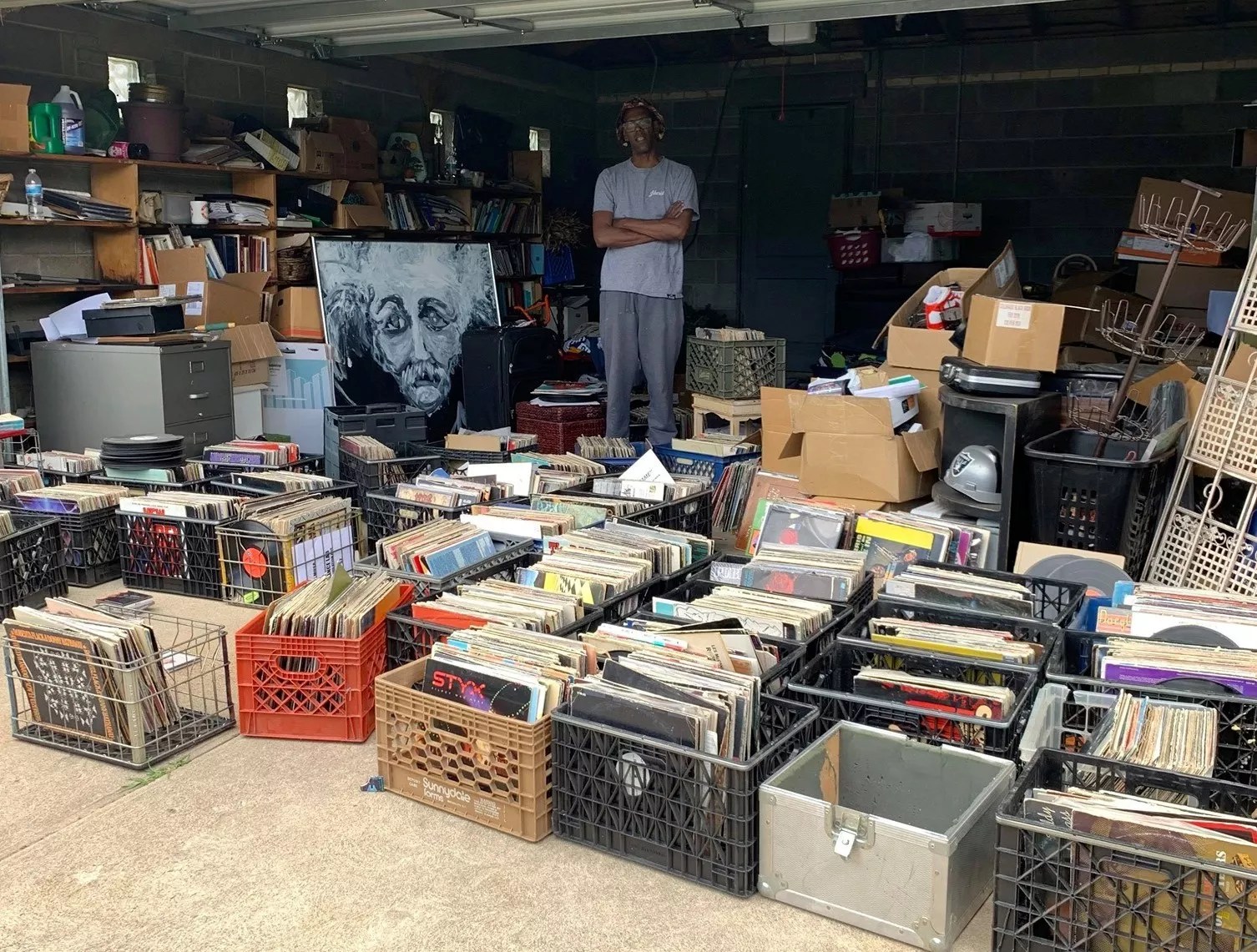
Courtesy of Musa Bailey

Audio By Carbonatix
At 44, Musa Bailey still listens to his parents.
“My dad called me. ‘You know, your mom is getting tired of these records. We’re going to hire one of those big dumpsters today, so it would be really great if you could come by,'” recalls Bailey. Going through forty-plus crates of vinyl amassed over 25 years of collecting was already on Bailey’s to-do list, but he hadn’t hurried to get the job done prior to his dad’s call.
Bailey got his start in Denver as a DJ, back when vinyl was the only medium available for spinning. He booked his first paid gig at eighteen: $200 to play a rave. He spent part of his twenties in New York, then returned to Denver, where he continued his DJ career, releasing mixtapes and curating sneaker-themed art shows and the mural wall outside Cold Crush, the Larimer Street hip-hop bar he co-founded in 2012. He became an anti-gentrification spokesman following the shuttering of Cold Crush in 2017 – the landlord decided not to renew the lease following the fatal shooting of local rapper Tyrone Adair Jr. and a number of noise complaints – and figured prominently in the community response to Ink! Coffee’s “Happily gentrifying the neighborhood since 2014” signage.
Following the Cold Crush closure, Bailey shifted focus to a new venture with a similar spirit, a downtown restaurant and club called Rock Steady. He also converted a portion of his home into an art-themed Airbnb dubbed “Bed and Brushes.” Amenities include a turntable, a mixer and about 100 records for guests to spin.
But Bailey’s most prominent role lately is that of dad to five-year-old Glen. He took himself off the DJ circuit, prioritizing spending five nights a week with his son over spending those five nights behind the decks. And when he started sorting through his records, he was thinking of Glen.
“All the records I kept, I had him in mind,” he says. “I got into records because of my parents. My dad had jazz records – Miles Davis and Coltrane. The whole idea of generationally passing down the music we listen to is a big part of why I kept what I kept.” But he didn’t keep much. He invited his friend and Denver DJ Gyp Da Hip and Recollect Records owner Austin Matthews to the garage. Gyp provided moral support, along with his expertise regarding record value.
“I don’t think I could have done it without him. It would’ve taken me forever,” says Bailey. “He was able to pull out the good ones really fast, whereas I would’ve been sitting there going, ‘Uh, I wonder if this is worth anything…'”
Records that he purchased for one specific sound automatically went to the get-rid-of pile. Duplicates went next. He kept Earth Wind & Fire and De La Soul. (Perry Como was not so lucky.) Having determined his keepers, he gave Gyp a few crates and sold the hefty remainder to Matthews.
“When he drove off, that was kind of tough. I saw them all packed up in the car, and I was like, ‘Shit, this is really happening,'” says Bailey. “A couple hours later I went and had a drink and I felt lighter. It reminded me of how much I love music to begin with. I would have never had that much if I didn’t really love music.”
The following day, Bailey posted a photo of himself surrounded by the crates on Facebook. Several friends expressed displeasure at not having been invited. Bailey admits he had considered inviting his crew to pore over the collection. Then he realized it would turn into a “weird flea market of chaos.”
“I didn’t know how I was going to react. I didn’t want a bunch of people around if I did break down. I didn’t cry – it wasn’t that emotional – but it just felt like something that there didn’t need to be a lot of people there for,” he says.
In other words, it’s not business; it’s personal.
Take his copy of A Tribe Called Quest’s 1993 classic, Midnight Marauders, for instance. Bailey was attending college in New York City when he bought the record from Fat Beats, the now-closed but legendary West Village hip-hop record shop. He took the subway home, put the record on…and had his mind blown. (Yes, he kept the record. He also owns a sealed copy of it “that I’m never going to open” and keeps a copy in his Airbnb room for guests. He hopes it blows their minds, as well.)
“Every record has the potential to do that, just depending on what you listen to. They connect you to a moment in time, and they’ll do that forever,” he says. As for letting the rest go, “It’s part of this corny cycle of life among DJs and especially record collectors: putting records back into the ether so you can get more records.”
Bailey isn’t precious about the integrity of vinyl or cynical about the so-called vinyl revival. He was an early adopter of digital DJ software Serato in the mid-2000s, grateful to no longer have to haul crates to gigs. (“I’m pretty sure I have a curved spine. My back is all messed up,” he says.) The records he kept, he can’t wait to share with his son. The records he released will find new owners with their own stories.
“I don’t think records are ever not going to be cool. I’m sure the market will go up and down, but they’re just cool, man,” he says. “They completely tie you into the moment that you’re listening to them. That’s why they’re so hard to let go of. That’s why they mean so much to people.”